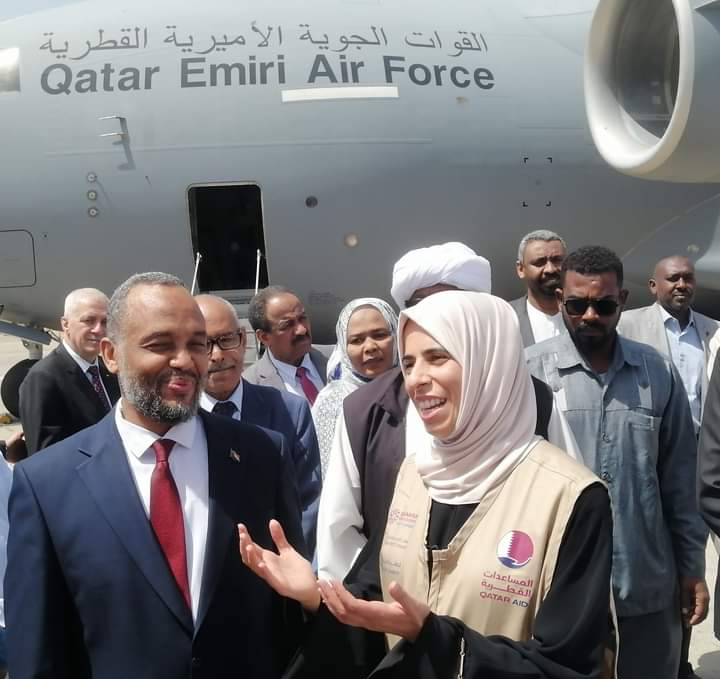Qatar sends 50,000 food baskets to Sudan amid reports of famine in Khartoum

Sudanese Health Minister Haisam Ibrahim welcomes Lolwah Al Khater, Qatari Minister of International Cooperation, at Port Sudan International Airport (Photo SUNA)
The Qatari Minister of International Cooperation arrived at the Port Sudan International Airport yesterday to inaugurate the distribution of 50,000 food baskets to Sudan regions affected by the nearly 11 months of fighting between the Sudanese army and the paramilitary Rapid Support Forces. The Sudanese government will distribute medical aid to several parts of the country. The Khartoum Emergency Room reported that about 240,000 families in the state are at risk of starvation.
The Qatari Minister, Lolwah Al Khater, will visit a number of health facilities in Port Sudan, capital of Red Sea state, where the Sudanese de facto government moved to after war erupted in Khartoum on April 15 last year.
Following visits to the Port Sudan Teaching Hospital, the Kidney Hospital, and the Medical Supplies Fund, she will meet with representatives of a number of international organisations, and Lt Gen Ibrahim Jaber, member of Sudan’s Sovereignty Council and acting prime minister.
She will also inaugurate the distribution of the food baskets, donated jointly by the Qatar Charity and Qatar Fund for Development.
Medicine
The Sudanese acting Minister of Health, Haisam Ibrahim, yesterday announced the provision of 700 tons of “medicines and medical consumables that will be distributed to the states, including Darfur and Khartoum.
“Despite the efforts made, the need is still great,” he told reporters in Port Sudan, and confirmed his ministry’s endeavours “to stabilise the pharmaceutical situation in the country”.
During his inspection of medical supply stores in Red Sea state and attending the distribution of medicines to the states, the minister explained that “the freight transports to the states contain medicines and medical consumables sufficient for a period of one to three months.
They contain medications “related to cancer and other emergency medicines, kidney dialysis and transplants, intravenous solutions, bags and reagents for blood transfusion services, heart disease consumables and devices, in addition to medicines against malaria, tuberculosis from global support”.
The minister said that “great efforts are being made to provide a stable medicine supply to the country through the Ministry of Finance, international charitable funds and donors”.
Famine
The Khartoum State Emergency Room reported yesterday that the situation in the city has become extremely dire, especially regarding food and treatment.
Hind El Ta’if, member of the Khartoum State Emergency Committee, told Radio Dabanga that Khartoum, Omdurman, and Khartoum North are witnessing “people dying from a lack of nutrition and medicine”.
She noted that 90 per cent of the community kitchens in the three cities had to stop providing food to families due to the cessation of support resulting from the internet blackout that started end January, which blocked money transfers by banking applications from abroad and within the country. “It is not yet known whether support will be available to resume their work during Ramadan.”
The activist explained that “the food is extremely scarce in Khartoum state. It is sold at very high prices that exceed the capabilities of the people, in particular after the cessation of cash transfers to families from their relatives and friends abroad”.
The MTN and Zain networks are still not operating in Sudan. Sudani returned end February in parts of the country under control of the SAF.
Three days ago, the Khartoum Emergency Room reported that approximately 240,000 families in the state are at risk of starvation. An unknown number of people recently died of malnutrition.
The UN warned already in September last year that 6.3 million people in Sudan would face severe hunger “if the political inaction persists”. The Clingendael Strategic Monitor confirmed this in mid-February, noting a very high risk of famine in Sudan.
Last week, UN World Food Programme (WFP) Executive Director Cindy McCain said that the ongoing war caused a humanitarian tragedy. “Now this catastrophe also risks becoming the world’s largest hunger crisis, unless fighting stops,” she said.











 and then
and then